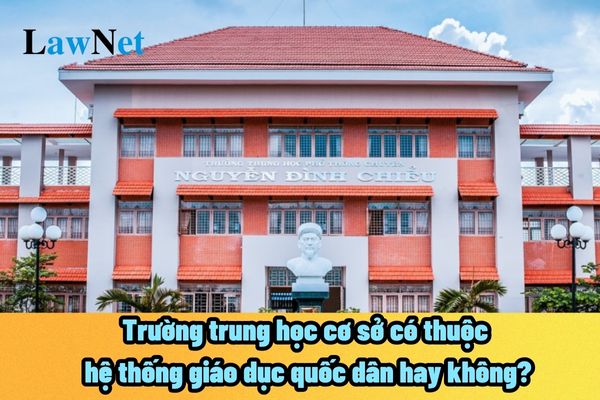Vietnam: Does a secondary school belong to the national education system? How many years do students study there?
Is a secondary school part of the national education system?
According to Article 6 of the Law on Education 2019 of Vietnam, the national education system is as follows:
- The national education system is an open and interconnected system that includes formal education and continuing education.
- Educational levels and training qualifications of the national education system include:
+ Early childhood education includes nursery education and kindergarten education;
+ General education includes primary education, secondary education, and high school education;
+ Vocational education includes elementary level, intermediate level, college level, and other vocational training programs;
+ Higher education includes university level, master's level, and doctoral level.
- The Prime Minister of the Government of Vietnam decides and approves the structural framework of the national education system and the Vietnam National Qualifications Framework; stipulates the training duration, standards for each training level, and the minimum study load for vocational education and higher education levels.
- The Minister of Education and Training, and the Minister of Labor, War Invalids, and Social Affairs, within their respective duties and authority, stipulate the entrance thresholds for college and university levels related to teacher training and health-related fields.
Referencing the above regulation, within the educational levels and training qualifications of the national education system, secondary education (within which there are secondary schools) and other educational levels are included.
Thus, secondary schools are part of the national education system.
How many years do students study in secondary school?
According to Article 28 of the Law on Education 2019, educational levels and entry ages are prescribed as follows:
Educational levels and entry ages
1. Educational levels and age groups of general education are regulated as follows:
a) Primary education lasts for 05 school years, from the first to the fifth grade. The entry age for the first grade is 06;
b) Lower secondary education lasts for 04 school years, from the sixth to the ninth grade. Students must complete the primary educational programme before entering the sixth grade. The entry age for the sixth grade is 11;
c) Upper secondary education lasts for 03 school years, from the tenth to the twelfth grade. Students must complete the lower secondary educational programme before entering the tenth grade. The entry age for the tenth grade is 15;
2. Cases where schooling could be commenced at younger ages or at higher ages prescribed in clause 1 of this Article are as follows:
a) Commencing schooling at younger ages for students with early intellectual development;
b) Commencing schooling at older ages for students repeating classes, students living in areas with exceptional socio-economic difficulties, students belonging to ethnic minorities, disabled and handicapped students, students with physical or intellectual disadvantages, orphan students, students of poor households, students returning from overseas and other cases as prescribed by law.
3. General education shall be divided into 2 phases: basic education and career-orientated education. Basic education includes primary education and lower secondary education; career-oriented education is upper secondary education. Students of institutions of vocational education shall learn the upper secondary education knowledge.
4. The Minister of Education and Training shall stipulate the teaching and learning of the Vietnamese language to children of ethnic minorities prior to the commencement of the first grade; the teaching of the upper secondary education knowledge in institutions of vocational education; and the cases as prescribed in clause 2 of this Article.
Secondary education is conducted over 04 school years, from grade six to the end of grade nine. Students entering grade six must have completed the primary education program. The age for students entering grade six is 11 years, calculated by the calendar year.
Thus, students will study for 04 years in secondary school, from grade six to the end of grade nine, except for cases of grade repetition.

Is a secondary school part of the national education system? How many years do students study there? (Image from the Internet)
Who is eligible for universal secondary education provided by the state?
According to Article 14 of the Law on Education 2014 which stipulates the universalization of education and compulsory education as follows:
Universalization of education and compulsory education
1. Primary education is compulsory.
The State shall provide the universalization of preschool education to 05-year-old children and provide the universalization of lower secondary education.
2. The State shall be responsible for implementing compulsory education throughout the country; planning and facilitating the universalization of education.
3. All citizens within defined age groups shall have the obligation to learn in order to contribute to the universalization of education and complete the compulsory education programme.
4. Families and guardians shall enable their members in defined age groups to receive education in order to contribute to the universalization of education and complete the compulsory education programme.
The state implements universal preschool education for 05-year-old children and universal secondary education.
Thus, according to the regulations, all citizens within the stipulated age range are eligible for universal secondary education.
Concurrently, the state is responsible for implementing compulsory education nationwide; deciding on the plan, and ensuring conditions to implement educational universalization. Families and guardians are responsible for creating conditions for family members within the stipulated age range to study and fulfill educational universalization and complete compulsory education.

